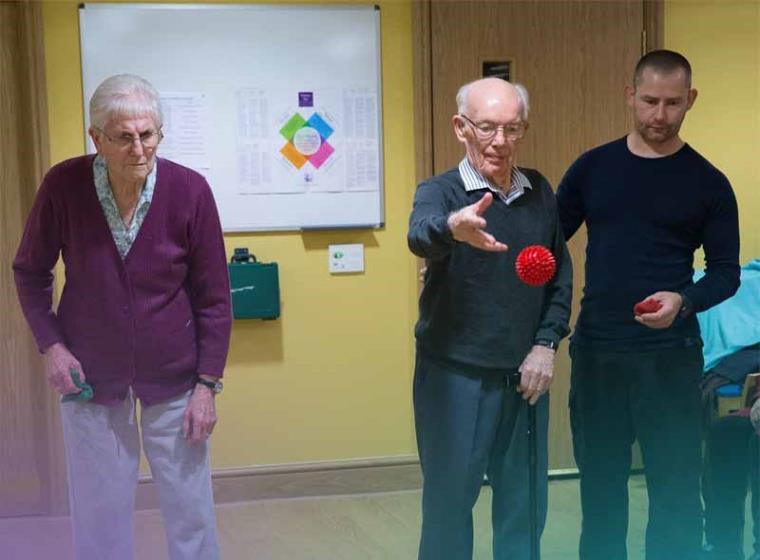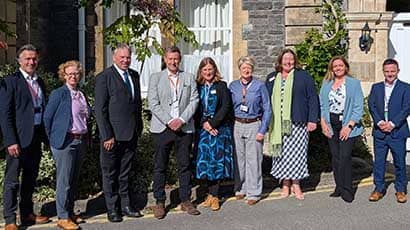Tailored group exercise benefits over-65s with mobility limitations

A landmark study has demonstrated long-term positive impacts and cost effectiveness of tailored group exercise for over-65s with mobility limitations.
The study examined the effectiveness of a community-based group exercise programme designed for people aged 65 and over with mobility limitations. It showed the REtirement in ACTion (REACT) programme prevents physical decline and is cost-effective to run. The team behind it say it should be rolled out nationwide.
A decline in mobility associated with ageing can greatly reduce quality of life, lead to loss of independence, generate substantial health and social care costs, and reduce overall life expectancy. Pressure on healthcare systems is set to be exacerbated by the rapid expansion of the older population. Currently, three in 10 people of state pension age are classified as disabled due to mobility limitations.
REACT – otherwise known as the REtirement in ACTion programme – is an innovative, behaviour change intervention targeted specifically at older adults who are beginning to experience mobility limitations (e.g., those who are beginning to find climbing upstairs, walking to the shop, or getting up from a chair more of a challenge). It aims to prevent further decline in mobility through exercises that target lower limb strength, balance, and stamina.
Watch participants talk about the study
The programme focuses on fun, social interaction and building a community through the group-based sessions whilst providing accessible strength, balance, mobility, and cardio-vascular exercises tailored to each participant’s needs.
Based on results from a large, randomised control trial, the international research team from the universities of Bath, Birmingham, Exeter, and the University of the West of England (UWE Bristol) (UK) and the University of Maryland School of Medicine and Wake Forest (US) say that REACT can help older people avoid a downward spiral of declining mobility, which can accelerate and lead to social isolation and loss of independence.
Funded by the National Institute for Health Research (NIHR) – Public Health Research programme, REACT ran across three sites (Bath / Bristol, Birmingham, and Devon) over four and a half years. It involved 777 participants aged 65 and over (the oldest participant was 98). Participants were split into either an intervention or a control group.
Those in the intervention group attended REACT twice a week for three months and then once a week for a further nine months. Those in the control group attended three separate ‘healthy ageing’ classes over the course of the year. By comparing the two groups, researchers were able to test the effectiveness of REACT on lower limb mobility, as well as looking at health and social care usage.
Their results, which are published today [Monday 21 March 2022] in two papers in the Lancet Public Health, show that:
- At 24-months (12 months after the completion of the REACT intervention), the participants who had attended sessions had significantly greater mobility than those who did not, suggesting both a short and long-term positive effect.
- This meant REACT participants found it easier walking, climbing stairs, and had greater independence performing daily activities.
- At least one strength, balance, and mobility exercise session per week (a fairly low level of commitment) was sufficient to provide meaningful benefits on lower limb physical function.
- Per person, the cost of delivering the programme was £622, but the health care savings were £725 over two years. Longer-term savings could be far higher.
Professor Afroditi Stathi, REACT Chief Investigator from the University of Birmingham explains: “Physical activity carries a wide range of benefits for older people including a longer and healthier life, prolonged independence and autonomy, better mobility and improved wellbeing. Yet, many older people face a downward spiral of declining mobility, whereby the less active they are, the more limited they become.
“Through REACT we have shown that this steady decline is avoidable. It can be prevented, or in many cases be reversed through an exercise programme that is individually tailored and progressive.
“At least one REACT exercise session per week seems sufficient to provide clinically meaningful benefits on lower limb physical function and it is highly cost-effective. This is a strong public health message to give to older adults, both in the UK and around the world.”
Bath-based REACT participant, Mr Fayek Osman*, aged 74, said: “The programme improved my wellbeing as my walking ability and stair climbing are improving. REACT has been of great benefit to me and encouraged me to continue with advanced level of activities. It also strengthens my belief that some exercise is better than nothing at all.”
Dr Tristan Snowsill of the University of Exeter, who examined the economic data from the study with Professor Antonieta Medina-Lara, said: “We found clear evidence that quality of life was improved in the REACT group. This alone would most likely have been enough to justify the cost of the programme using the standard rule for cost-effectiveness. To also find that REACT participants used fewer health and care services makes the REACT programme one of the clearest cases of value for money I have come across.”
The team now hope REACT can be rolled out nationwide.
Professor Selena Gray, of UWE Bristol, helped design and oversee the study. She said: “This important study demonstrates the significant impact on health and wellbeing that a low intensity community based intervention has on older people who are at risk of losing independence. The evidence shows that the intervention was cost effective, delivering benefits to the health care system as well as individuals. Increasing investment in this area should be a priority.”
Dr Janet Withall, the REACT Trial Manager added: “We would like to thank all 777 REACT participants who contributed their time and enthusiasm, and without whom the study would not have been possible. We also could not have conducted the REACT study without all our delivery partners who supported us with their time, resources and expertise.”
REACT delivery partners included: Bath and North East Somerset Council; Exeter and Solihull City Councils; Westbank Charity; St Monica Trust, Bristol; Bristol Ageing Better; St John’s Hospital, Bath; Age UK Birmingham; Agewell, West Midlands; Sandwell and West Birmingham Hospitals NHS Trust; the Portway Lifestyle Centre and Solihull Borough Council, Birmingham.
Find out more about REACT.
Related news

12 December 2025
UWE Bristol’s environmentally conscious and student-focused accommodation wins three awards
Purdown View, the world's largest certified Passivhaus student accommodation development, has been recognised at Property Week Student Accommodation Awards.

13 November 2025
Alliance Medical and UWE Bristol launch UK’s first PET-CT postgraduate certificate
In a move set to transform imaging education, Alliance Medical (AML) and UWE Bristol have joined forces to co-design and develop the UK’s first PET-CT Postgraduate Certificate (PG Cert).

10 November 2025
Lessons from Low Traffic Neighbourhoods will drive better public engagement, study finds
Lessons from Low Traffic Neighbourhoods have informed a new toolkit to improve engagement with the public on challenging local street issues.

29 September 2025
Smartphone use hitting struggling pupils hardest, major study finds
Young people struggling with their studies at school are much more likely to have negative experiences on their smartphones than their better performing peers, a major new study has found.

11 September 2025
New study to investigate augmented reality as an intervention for emotionally based school avoidance
A UWE Bristol researcher will support a new study exploring whether an augmented reality board game can help young people with emotionally based school avoidance (EBSA).

28 July 2025
Student wins bronze medal at World Aquatics Championships on her graduation day
UWE Bristol sports rehabilitation student Izzy Thorpe made waves at the World Aquatics Championships winning a bronze medal in artistic swimming on the same day she was meant to be crossing the stage at her university graduation ceremony.

28 May 2025
Leading organisations fighting to end youth violence in cities join UWE Bristol event panel
Leaders from Bristol-based Empire Fighting Chance and Canadian non-profit REACH will speak at the next Bristol Distinguished Address Series.

09 May 2025
UWE Bristol among first universities in UK to introduce sanitary waste bins in male toilets
UWE Bristol is among the first universities in the UK to introduce sanitary waste bins in male toilets for the disposal of incontinence products.

11 April 2025
UWE Bristol academics among emerging scientific leaders to receive share of £7.6m for health research
Two UWE Bristol researchers are among the recipients of a £7.6 million investment from the Academy of Medical Sciences aimed at tackling urgent health challenges.

09 April 2025
New research to support a thriving health and care workforce is launched
A national research partnership will explore ways to support wellbeing and sustainability in the NHS and social care same day and urgent care workforce.

10 March 2025
UWE Bristol to explore the power of open water swimming at upcoming event with The Wave founder Nick Hounsfield
An inspiring tale of grit and resilience will be told to audiences at the first BDAS event of 2025 as UWE Bristol welcomes Nick Hounsfield, founder of The Wave.

28 February 2025
Paramedics in GP surgeries may ease workload but not NHS costs, study finds
Paramedics working in GP surgeries help reduce GP workload but do not contribute to cost savings to the NHS, according to the first major study of the clinical and cost-effectiveness of paramedic compared with GP consultations.






